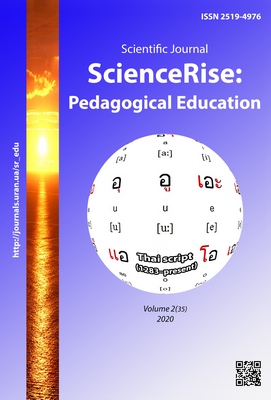Competence approach as methodological guidelines in the formation of the discourse competence of future journalists
DOI:
https://doi.org/10.15587/2519-4984.2020.199558Keywords:
discourse, communication, competence, competence approach, discourse competence, future journalists, linguisticsAbstract
The article deals with the relevance and importance of introducing a competency approach in the process of forming the discourse competence of future journalists. Attention is drawn to the fact that the rapid development of the information society requires highly skilled competitive specialists in the media sphere, who would not only have the maximum amount of necessary knowledge, but also the ability to use them promptly and creatively. The essence of the concepts that make up the definition of "discourse competence" is considered. It is noted, that discourse is a process, related to language creation, and text is the end result of the language activity. When comparing the terms "competence" and "readiness", it is proved, that they are closely related, although significantly different. In general, readiness can be defined as the ability to act on the basis of competences (qualitative characteristics). It is noted, that the preparation of future journalists is currently giving a significant advantage to the theoretical study of the material and the lack of practical skills that would contribute to the formation of discourse competence of the future journalist, which, in turn, is a determining component of communicative competence. Its main components are the ability to perceive and analyze, as well as qualitatively formulate sound conclusions using linguistic means. The proper mastership of the state language by future journalists in the professional communication forms a conscious linguistic behavior, which is the basis for spiritual and intellectual development of the individual. The urgent need to train high level professionals with developed practical skills of the professional communication and today ineffective practice of teaching the Ukrainian language in the professional direction of future journalists in higher education institutions necessitate in-depth elaboration of appropriate methodological foundations. And it is important, that the most competent approach is the main guideline in the process
References
- Raven, Dzh. (1999). Pedahohycheskoe testyrovanye: problemy, zabluzhdenyia, perspektyvi. Moscow: Kohyto-Tsentr, 144.
- Hluzman, O. V. (2009). Bazovi kompetentnosti: sutnist ta znachennia v zhyttievomu uspikhu osobystosti. Pedahohika i psykholohiia, 2, 51–61.
- Selevko, H. (2004). Kompetentnosty i ikh klassyfykatsyia. Narodnoe obrazovanye, 4, 138–143.
- Khoruzha, L. L. (2007). Kompetentnisnyi pidkhid v osviti: retrospektyvnyi pohliad na rozvytok idei. Pedahohichna osvita: teoriia i praktyka. Seriia «Psykholohiia. Pedahohika», 7, 202.
- Zimniaia, I. A. (2003). Kliuchevye kompetentsii – novaia paradigma rezultata sovremennogo obrazovaniia. Vysshee obrazovanie segodnia, 5, 34–42.
- Yermakov, I., Sofii, N.; Yermakov, I. (Ed). (2005). Zhyttieva kompetentnist osobystosti: vid teorii do praktyky. Zaporizhzhia: Tsentrion, 640.
- Zhuk, O. L. (2008). Belarus: kompetentnostnyi pokhod v pedagogicheskoi podgotovke studentov universiteta. Pedagogika, 3, 99–105.
- Babenko, V. V. (2019). Formuvannia komunikatyvnoi kompetentnosti maibutnikh uchyteliv ukrainskoi movy i literatury u protsesi navchannia stylistyky. Kyiv, 25.
- Kondratenko, N. (2018). Metodyka formuvannia komunikatyvnoi kompetentnosti maibutnikh zhurnalistiv na zasadakh linhvokulturolohii. Kyiv, 24.
- Kolisnyk, Yu. (20100. Tekst i dyskurs: problemy definitsii. Visnyk Nats. un-tu «Lvivska politekhnika». Seriia «Problemy ukrainskoi terminolohii», 675, 111–114.
- Kulykova, L. A. (2017). Tekst i dyskurs yak fihury komunikatsii. Chasovo-prostorova i vikova spetsyfika nimetskomovnoho tekstu. Melitopol. Available at: http://nimfilmdpu.mozello.com/vseukranska-nternet-konferencja/movoznavstvo/params/post/1336872/
- Budnik, A. O. (2008). Dyskurs u sferi usnoi i pysemnoi komunikatsii: linhvodydaktychna interpretatsiia problemy. Zbirnyk naukovykh prats. Pedahohichni nauky, 50 (2), 68–72.
- Arutiunova, N. D. (1990). Diskurs. Lingvisticheskii entsiklopedicheskii slovar. Moscow, 136–137.
- Krichevskii, V. Iu. (2004). Professiia – direktor shkoly. Saint-Peterburg: SPbAPPO, 271.
- Pentyliuk, M. I. (Ed.) (2015). Slovnyk-dovidnyk z ukrainskoi linhvodydaktyky. Kyiv: Lenvit, 320.
Downloads
Published
How to Cite
Issue
Section
License
Copyright (c) 2020 Roman Zhyvolup

This work is licensed under a Creative Commons Attribution 4.0 International License.
Our journal abides by the Creative Commons CC BY copyright rights and permissions for open access journals.
Authors, who are published in this journal, agree to the following conditions:
1. The authors reserve the right to authorship of the work and pass the first publication right of this work to the journal under the terms of a Creative Commons CC BY, which allows others to freely distribute the published research with the obligatory reference to the authors of the original work and the first publication of the work in this journal.
2. The authors have the right to conclude separate supplement agreements that relate to non-exclusive work distribution in the form in which it has been published by the journal (for example, to upload the work to the online storage of the journal or publish it as part of a monograph), provided that the reference to the first publication of the work in this journal is included.







